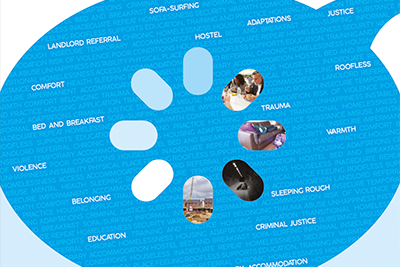Part of the Office of Social Service’s Reflections series
Published: November 2019
Foreword by Sean Holland
How often have you said the simple words, “I’m going home.” We tend to associate home with words like security, comfort, warmth and belonging and when those are the things that home provides, there is no place like it. Social workers know that home can also be a place where trauma, abuse and unhappiness happen. Home is both a physical place and the feelings we associate with it.
For a variety of reasons, people using social work services can face becoming homeless or living with the risk of becoming homeless.
While there is no such thing as a typical experience of being homeless, being homeless will always make every aspect of your life harder. In terms of basic survival, being homeless may leave you without shelter and safety. It may also compromise your physical and mental health, make you both more likely to be a victim of crime and more likely to be arrested and make things like getting an education or employment incredibly difficult.

Homelessness is certainly a social problem but for individuals, it is a personal catastrophe.
That is why social workers need to understand homelessness with its multiplicity of causes and consequences. Whatever the reasons for social work involvement in a person’s life, social workers must always be prepared to use their expertise and skills, working collaboratively with others to respond to homelessness and the threat of homelessness.
I hope that this edition of Reflections will help social workers in that task and that it will be a useful resource for social work educators and trainers.
Sean Holland
Chief Social Work Officer
